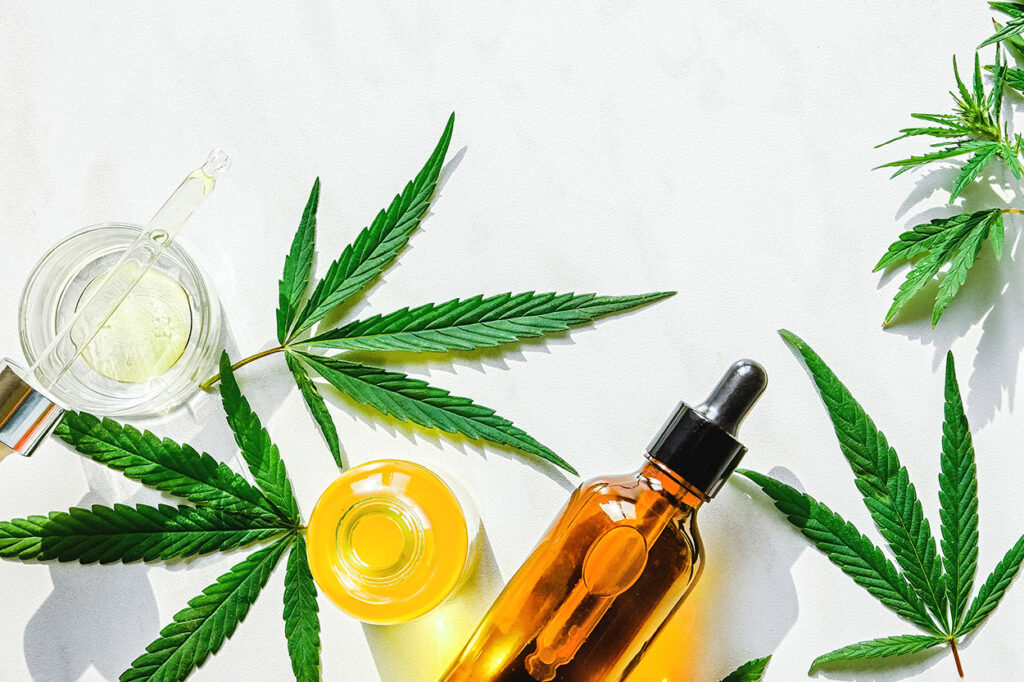

It’s no secret that CBD oil is making its rounds as one of the hottest new topics in skincare. It seems like you can’t go a single day without spotting a new CBD oil skincare product—from creams to serums to face masks, CBD oil seems to be in everything nowadays.
As an esthetician who has clients to please, you know better than to fall prey to every skincare fad and fluke that floods the market, but that doesn’t mean you shouldn’t pay attention to what’s happening in the world of skincare. You’re probably asking yourself, “so, what’s really the deal with this CBD oil stuff? Does it actually have skincare benefits?”
That’s exactly what we’re here to answer. If you’re ready to stop wondering if CBD oil is all buzz and hype and are ready to learn the cold hard facts, then you’re in the right place.
So, you’ve heard the term CBD Oil before—it’s a pretty hot buzz word in our industry at the moment. But, do you truly know what it is or why it’s becoming such a popular ingredient in skincare products?
We’ll start with some basics to give you the need-to-know background details to build on. CBD is actually called cannabidiol. It’s a component of marijuana or hemp plants—but without the mind-altering properties of marijuana’s tetrahydrocannabinol (TCH). CBD is typically sold as an oil, but when it’s extracting from the flowers and leaves of marijuana and hemp plants, it’s actually a powder—typically, that powder is mixed with some kind of oil (like olive oil, coconut oil, or hemp oil) in order to enhance its application.
Even though you probably have a clear idea of what CBD oil is, we want to make sure we drive this point home—CBD oil is not a product that can “get you high” when used as skincare (or for other purposes) because it does not contain THC, which is the intoxicating component of the marijuana or hemp plant.
You might be thinking something along the lines of “oh, so, CBD oil is like hemp seed oil, right?” Actually, they’re different (it’s confusing, but bear with us for a moment). Hemp seed oil is similar because it’s also extracted from hemp plants, but unlike CBD oil, it does not contain a richly concentrated dose of cannabidiol. In fact, hemp seed oil only has trace amounts of this substance (if any at all), whereas CBD oil is absolutely packed with concentrated cannabidiol.
By now, you’ve probably got CBD down to a science, but we still haven’t answered the most important question of all—does CBD oil have skincare benefits?
The short answer? Yes.
The longer answer? Yes, it does, and for several unique, varying reasons, but not all CBD oil products are created equally. Some research shows that CBD oil is beneficial for a diverse mix of skin issues, however, scientific studies are needed to 100 percent confirm these results.
CBD is a natural substance that comes from a plant, right? So, it’s no surprise that there are clear antioxidant properties. It’s these properties that are said to help reduce wrinkles and signs of aging in complexions. Like other antioxidants, CBD oil is said to counteract free radicals, diminish wrinkles, brighten skin, and improve skin tone overall. It’s impossible to say that CBD oil is the antioxidant that’s going to make the most difference in signs of aging—there are so many antioxidants out there that help combat these signs—but it’s certainly an ingredient to consider.
As we all likely know, acne is an inflammatory condition—as an esthetician, that’s likely no surprise to you whatsoever. And while acne can flare up from a multitude of causes, it’s a well-known fact that applying products that help to reduce inflammation to breakouts will reduce the appearance of those breakouts as well as redness that’s related to the flare-up.
CBD has largely been credited for its anti-inflammatory benefits when topically applied, which, of course, means that it’s a promising ingredient for complexions that battle inflammatory acne. CBD oil is said to calm down irritated and inflamed skin, help complexions look better, and to reduce inflammatory pain as a result of acne. There’s even research that shows CBD has the potential to minimize excess oil (sebum) production because of its balancing properties.
CBD is also said to have soothing, calming properties that can help reduce redness, normalize complexions, and help with skin’s reactivity. A dash of CBD oil skincare could help all skin types battle the dose of environmental stressors our complexions deal with daily.
Here are a few, quick things you should know about CBD oil skin care products before you buy them!
IN-HOUSE, EZ-RUN & SAMPLES SHOPS TERMS AND CONDITIONS AGREEMENT
By placing this order with Spa de Soleil, Inc. (“Developer”), you (“Client”) agree to the following terms and conditions of sale. Please review carefully and confirm your agreement with your signature below.
This agreement constitutes the entire understanding between Client and Developer with respect to the subject matter and supersedes all prior agreements between the parties and any representations or promises made by third parties, whether oral or written. This agreement may be amended or modified only by an instrument in writing, signed by an authorized representative of both parties.
For questions regarding your order or for any notices to be sent pursuant to this Agreement, email Developer at info@spadesoleil.com.